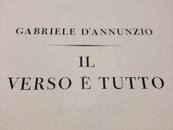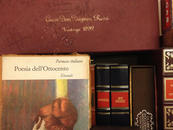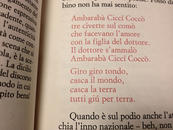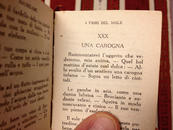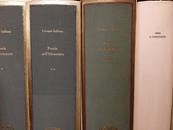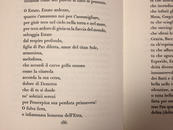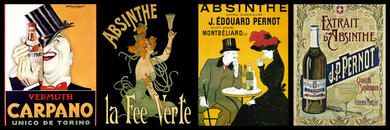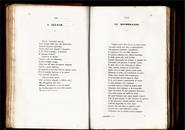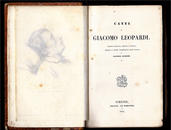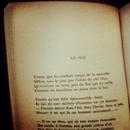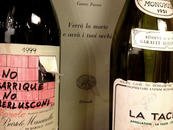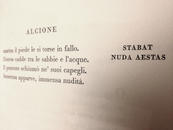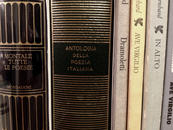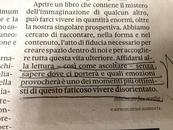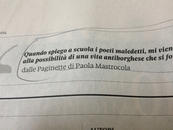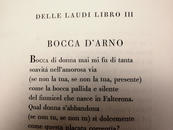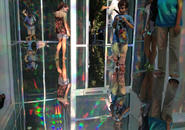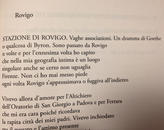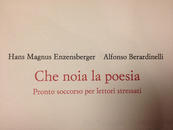Read between
“When I teach my students about the poets, I become slightly sad. We used to believe in their ideals, in the possibility of an anti-bourgeois life based on art that challenges clichés. But now?”
Words of Paola Mastrocola, writer and teacher, that appeared alongside an article recently published in the Italian Sunday paper “Domenica del Sole.” Addressing a couple of modern misconceptions – brevity and simplicity (the shorter, the better) – she focuses on periphrasis or circumlocution, the use of many words instead of one as a roundabout figure of speech. Vast, slow, placid, deep periphrasis is the bitter enemy of today’s day and age, which is based on concise, cacophonous, dull, repeated chirps.
In her article she cites the following immortal verses, nothing other than a huge periphrasis to say “when we were young”:
Silvia, rimembri ancora
quel tempo della tua vita mortale,
quando beltà splendea
negli occhi tuoi ridenti e fuggitivi,
e tu, lieta e pensosa, il limitare
di gioventù salivi?
Silvia, do you remember
That time of your mortal life
When beauty was resplendent
In your smiling, elusive eyes
And you, happy and pensive,
Mounted the threshold of youth?
[From “A Silvia” by Giacomo Leopardi]
Poetry thrives on periphrasis. Poetry, from the Greek poiesis that, contrary to what one might think, means “to make, to produce.” For thousands of years poetry has been a prestigious and privileged form of expression, sometimes even sacred, and characterized by the peculiar fact that the meaning of words are linked to a musical sound. “Poetry therefore contains some of the same qualities of music and is able to express concepts and moods in a more evocative and powerful way than prose.” These aren’t my words or those of Paola or of another old-fashioned poetry lover, but the consideration of a modern myth: Wikipedia. But if Wikipedia tells the truth (and of course it does!) why do we no longer try to be evocative?
“Because we live in the age of communication,” responds Mastrocola, “and not the age of poetry. If we were to say, ‘Siliva, to you remember when you were young?’ we would be saying the same thing in fewer words. We asked a very specific question and expect an equally specific response: Yes, I remember; no, I don’t remember. Brief, concise and cost-effective. And that is how we lost sight of our smiling, elusive eyes, the threshold of youth and the fact that we are mortal… Today we prefer ourselves this way. Today we communicate via text messages.”
We are so frugal therefore brief and simplified (or vice versa). In this sense, Wikipedia takes a serious risk in claiming that poetry is “evocative and powerful.” Extreme simplification, at the risk of becoming illiterate, is a major problem in today’s workplace. Nowadays copy and text are out. We live off of slogans and headlines. Copy is becoming tighter, and this is generally a good thing, since the language of advertising has always been full of clichés and peppered with mistakes and misprints. Today everything must be simplified (not simple, but “simplified”) and aimed towards profit, without wasting time, without poetry. If it isn’t simplified, it’s useless because it is a waste (of what? time, attention span, intelligence?). When we speak, we must be direct, cooperative and, of course, banal (therefore potentially popular and universally understandable). If what is happening in the advertising world spreads to all forms of human communication, we will only be able to interact with slogans. This will be a major cultural problem. No, it will be a major problem of civilization. I fear that if we loose the habit of thoughtful reading, critical analysis and accurate writing, we will be loosing the tools needed to deal with complexity. It seems trivial but it isn’t: our thoughts, our messages and even our actions are based on language. And banal language can’t help but generate banal thoughts, messages and actions. The only possible benefit is profit, which makes it holy. And the rest? Upholstery for idlers, apparently.
Also, perhaps above all, it’s a problem of education. This is what we need to work on. If the enemy of cultural development is simplification, and this is unquestionable, education must provide the tools for dealing with complexity, and not simply for the “return.” I ask myself: is this the direction we are headed?
I will now briefly discuss a personal occurrence. My profession is based in good part on argumentation, which is complex because it involves varied, delicate and often contradictory fields like personal taste, the harmony of shapes, visual perception, collective memory, market logic, consumer habits, etc. To justify some of my choices, and to respond to client’s requests, I am required to explain my solutions step by step. They are always written, to be clear and to be able to share them with anyone involved in decision-making. A group that often grows during the process.
Recently, a client with whom from time to time I have real problems of (mutual) comprehension confided, almost carelessly, that he stopped reading emails that are longer than five lines because you communicate all that needs to be said in five lines (and who uses more than five lines shouldn’t be paid attention to because it means they are crazy, part of another world!)
I’m not at all surprised that he doesn’t recognize his savage habit as the “cause” of our difficulty in understanding one another (the difficulty that is an effect of the problem). Accustomed to giving orders or obeying them for mere utilitarianism, he has begun communicating by protocol with anti-dialectical language that can’t be debated or questioned. As if these loopholes don’t slow down business? They are yet another example of how economic success can’t measure human success, their intelligence level – but who is interested in intelligence? (from the Latin intellectus, -us, from the past participle of the verb intellìgere = intellègere “to understand, comprehend,” composed of intus and lègere meaning to “read between.”
What I think.
There is nothing more outdated, revolutionary and conflicting with the main values of today – or the lack of values – than picking up a book during a hot night of July and reading poems that you have always loved, finding comfort, pleasure and oblivion. You rediscover the disruptive power and evocative force, together with the possibility of imagining, even if it is only imagining, and anti-bourgeois life that is based on art and challenges clichés (with a sharp, terrible, bright and clear blade of poetic speech).
And I said it all, in a couple more than five lines.
10/07/2014 Filippo Maglione



